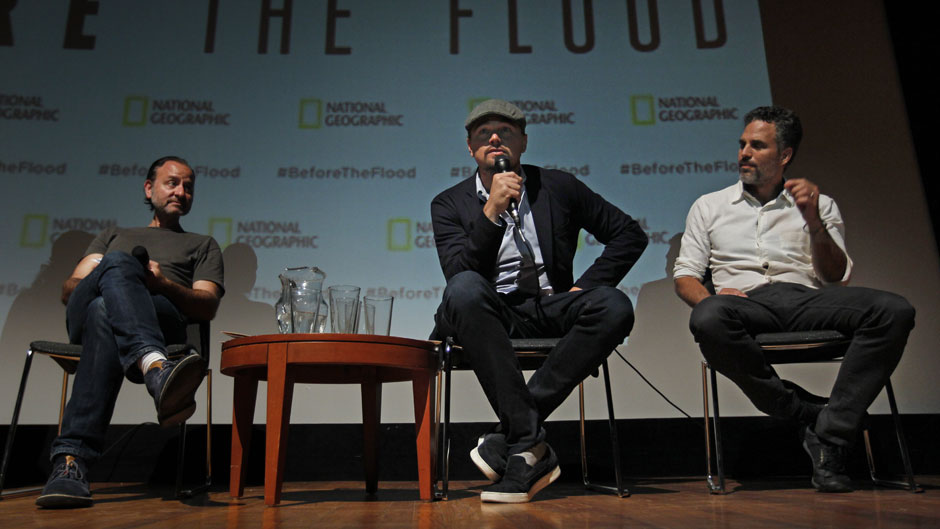From the White House on one day to a college campus cinema the next, Academy Award-winning actor and eco-activist Leonardo DiCaprio screened his powerful new documentary about the damaging effects of climate change at the University of Miami on Tuesday, moderating a subsequent panel discussion in which he told an audience of hundreds that climate change is “too important” a topic to ignore.
“So many of these issues are going to affect your state directly,” DiCaprio said at UM’s Cosford Cinema, referring to sea-level rise, the destruction of coral reef ecosystems, and other climate change-induced conditions that especially imperil Florida and its coastal cities and are highlighted in his 96-minute film Before the Flood.
A day removed from its screening on the White House South Lawn, where DiCaprio talked environmental issues with President Barack Obama, one of the prominent world leaders featured in the film, the documentary will air in 171 countries on the National Geographic channel on October 30, bringing its important message to more than 450 million people.
At Cosford on Tuesday, DiCaprio, who picked up the 2016 Best Actor Oscar for his role in The Revenant and has been designated by United Nations Secretary-General Ban Ki-moon as a UN Messenger of Peace with a special focus on climate change, shared the stage with the documentary’s director, Fisher Stevens, and two scientists who study how climate change is impacting our planet and its people.
“I’m afraid very much for the people as much as for the ecosystems,” said Kenny Broad, a UM environmental anthropologist, veteran cave diver, and former National Geographic Explorer of the Year, when asked by DiCaprio what frightens him most about climate change.
“We think of dramatic flooding, the melting of ice, and losing [the] polar bears, but it’s the ground water beneath our feet” that should be studied more closely, said Broad. “More than 95 percent of the world’s drinking water is from aquifers. It’s out of sight, out of mind, and we tend not to take the steps to protect it. It just takes a tiny bit of sea-level rise to really [impact] our groundwater. And who gets affected is going to be the more vulnerable populations.”
With Florida atop the list of states that will be impacted the most in coming years should sea levels continue to rise at their current clip, Rachel Silverstein, executive director of Miami Waterkeeper, said the state’s critical infrastructure, including nuclear power plants along the coastline, are at particular risk.
“We have the most built environment in the world here in Miami-Dade County at risk to sea-level rise and no silver bullet to deal with it,” explained Silverstein, an alumna of UM’s Rosenstiel School of Marine Atmospheric Science. “What we need are new solutions, and we can find those new solutions through research and applying things that we already know work.”
She called for increased awareness of the importance and plight of coral reefs, noting that in Florida over 80 percent of the diverse underwater ecosystems have perished since the 1970s due to the effects of ocean acidification and other climate change-related factors.
As the nation approaches another presidential election, DiCaprio said Florida once again will play a key role as a swing state in the race for the White House. “We can no longer afford to have political leaders out there who do not believe in the science of climate change,” he said.
His statement was an obvious dig at the Republican Party’s presidential nominee, Donald Trump, who has called climate change a hoax perpetrated by China.
What frustrates Broad more is not convincing the doubters, but getting people to sustain actions to reverse the effects of climate change.
“But that’s not surprising,” said Broad. “From an anthropological and evolutionary standpoint, we worry about short-term things. We’ve never had this sort of experience. We’ve never had a collapse of our climate system. We don’t need more scientists to convince people—we need more people who know how to touch upon emotions and morals. We need more people working more creatively.”
Still there is hope, Silverstein believes. In Miami-Dade County, political leaders have ramped up their efforts to take action on climate change, rethinking future infrastructure plans with a cautious eye toward sea-level rise. “I think that’s a big victory,” she said.
It will also take the nation’s youth to solve the problem. “I really believe in fighting for certain causes and certain issues, and climate change has been something I’ve been obsessed with for the past eight or nine years, not nearly as long as Leonardo,” said Before the Flood director Stevens. “But we’re here because we believe that the youth, universities, and high schools are the future. We want to try to get people to understand at a very young age that this is important.”
The screening was sponsored by the School of Communication, and the film, financed by the documentary division of Brett Ratner’s RatPac Entertainment, has “already been picking up some Oscar buzz,” said Dean Gregory J. Shepherd, who invited Ratner to the stage to comment on the project.
UM senior Savannah Geary, an ecosystem science and policy major, was one of the students in the audience who plans to take action through the making of documentaries like DiCaprio’s that address the problem.
Said Geary, “I would love to make something that would have even half the benefit that this [Before the Flood] is going to have.”

